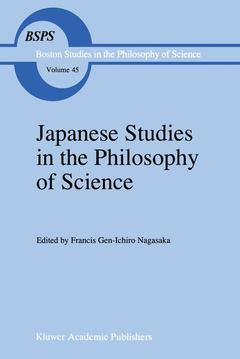Japanese Studies in the Philosophy of Science, Softcover reprint of the original 1st ed. 1998 Boston Studies in the Philosophy and History of Science Series, Vol. 45
Langue : Anglais
Coordonnateur : Nagasaka F.G.

The splendid achievements of Japanese mathematics and natural sciences during the second half of our 20th century have been a revival, a Renaissance, of the practical sciences developed along with the turn toward Western thinking in the late 19th century. The equally admirable results of Japanese philosophers (and historians) of science in our time followed upon a period less congenial to Western interests in the philosophical questions linked to modern science; and this reluctance to confront the epistemology, not even the humane significance, of the sciences went along with devotion to other Western trends. Thus, with the 'new' Japan of the Meiji restoration of 1868, and the early introduction of Western philosophy in the subsequent decade by Nishi Amane, a period of intellectual attraction to utilitarian, positivist, evolutionary, even materialist outlooks was soon replaced by devotion to scholarly work on Kant and Hegel, on ethical and general philosophical idealism. These studies often could emulate the critical spirit (the philosopher Onishe Hajime, praised for his own critical independence, was known as the Japanese Kant) but the neo Kantian and neo-Hegelian developments were not much affected by either empirical sciences or theoretical speculations about Nature. The pre-eminent philosopher of Japan ofthe first half of our century was Nishida Kitaro, with a pioneering treatise A Study of the Good, who, with his leading student Tanabe Hajime, formed the 'Kyoto School' of pre-war philosophy.
1. The Mind as Human Jobs.- 2. Other Minds.- 3. On the Individuation of Events.- 4. Mind, Privacy and Causality.- 5. Double Look: Science Superposed on a Perceptual World.- 6. Scientific Laws as Tools for Taxonomy.- 7. Causality and Temporal Irreversibility.- 8. The Structure of Statistical Inference.- 9. On Inference in Science.- 10. Comment on the Machida-Namiki-Araki Theory.- 11. Who Are Precursors of Galileo in His Pisan Dynamics? — A Criticism of Professor Moody’s Paper.- 12. Philosophical Meanings of the Concept of Evolution.- Index of Names.
In this book, 12 contemporary Japanese philosophers of science are presented using a generous sampling of their works as scientists and philosophers who have investigated the foundations of natural science, the philosophy of mind and especially of perception, the logic of inference and of time, causality, and evolution. The editor, Francis Gen-Ichiro Nagasaka, provides a historical survey of the development of philosophy of science in Japan from sparse beginnings rooted in German idealism before 1945, to a flourishing in the empirical Western tradition in the latter half of the 20th century. Contributors include Nobushige Sawada, Wataru Kuroda, Hidekichi Nakamura, Hyakudai Sakamoto, Shozo Ohmori, Natuhiko Yosida, Satoshi Watanabe, Akira Ohide, Hiroshi Kurosaki, M. Hutsuo Yanase, Shuntaro I
Date de parution : 10-2012
Ouvrage de 202 p.
16x24 cm
Thème de Japanese Studies in the Philosophy of Science :
Mots-clés :
epistemology; evolution; mind; philosophy of science; science
© 2024 LAVOISIER S.A.S.
